Unhide Columns in Excel is your trusty companion in data visibility and precision. This invaluable feature transcends the confines of hidden data, allowing you to bring vital information back into the spotlight with ease. With ‘Unhide Columns in Excel,’ you’re not just revealing data; you’re empowering yourself to review, correct, and customize your worksheets with unparalleled accuracy. Embrace the simplicity and impact of this function to ensure that your Excel workbooks are comprehensive, error-free, and tailored to your specific needs. Whether you’re conducting data reviews, making corrections, or crafting customized reports, ‘Unhide Columns in Excel’ is the tool that ensures your data remains accessible and your Excel experience is nothing short of efficient and precise.
This Content Covers:
- How to Unhide the First Column?
- By Dragging the First Column using Mouse
- Unhide the First Column using the Go to Option
- Unhide the First Column using Format Option.
- How to Unhide All Hidden Columns?
- Unhide All Columns Using Right Click
- Using a Keyboard Shortcut
- Unhide All Columns by Setting the Column Width
- Using a VBA Script
- How to Show all Hidden Columns Via Go to Special?
- How to Check a Workbook for the Number of Hidden Columns?
- How to Disable Unhide Column Option in Excel?
1.How to Unhide the First Column?
1.1 By Dragging the First Column using the Mouse
Step 1: Place the cursor on column B’s left border. The cursor will turn into a double arrow pointer.
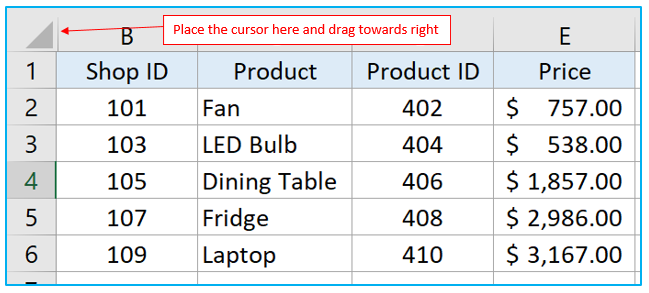
Step 2: Click and drag it towards the right to unhide the first column.
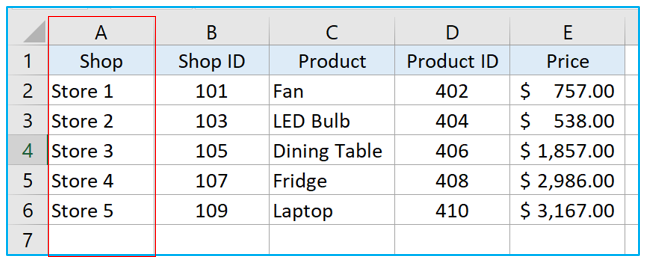
1.2 Unhide the First Column using the Go to Option
Step 1: Press the F5 button of your keyboard and then go to Format>>Hide & Unhide>>Unhide Columns. Column A will be visible again.
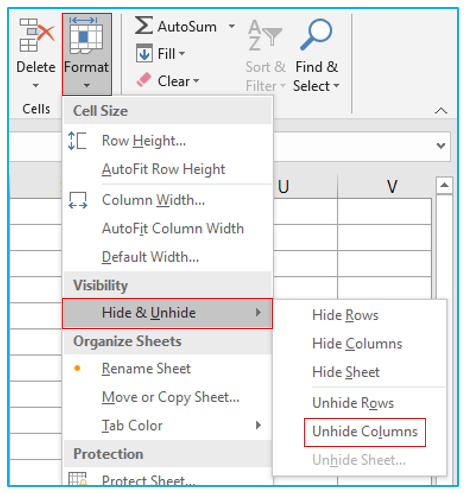
Step 2: When you click on Unhide Columns, column A will be visible again.
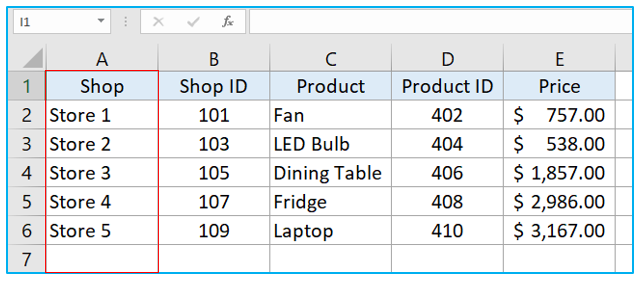
1.3 Unhide the First Column using the Format Option.
Step 1: Select and then drag column B towards the left until the border color changes, this means column A is selected.
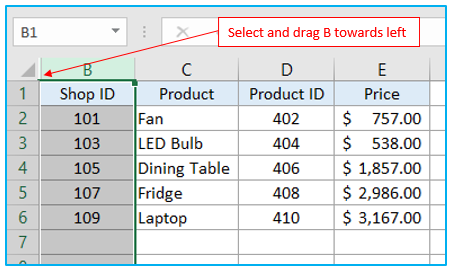
Step 2: From Home tab go to Format>>Hide & Unhide>>Unhide Columns. Column A will be visible again.
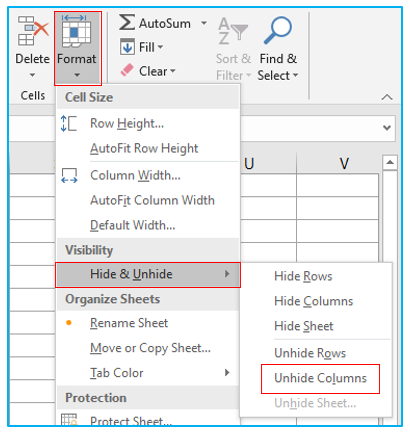
2. How to Unhide All Hidden Columns?
2.1 Unhide All Columns Using Right Click
Step 1: Column A, C, E are hidden in this worksheet. To unhide them click on the triangle in the upper left corner of your table to select all the cells or use CTRL+A shortcut to select all the cells. Now right-click on any of the column headers. Select Unhide.
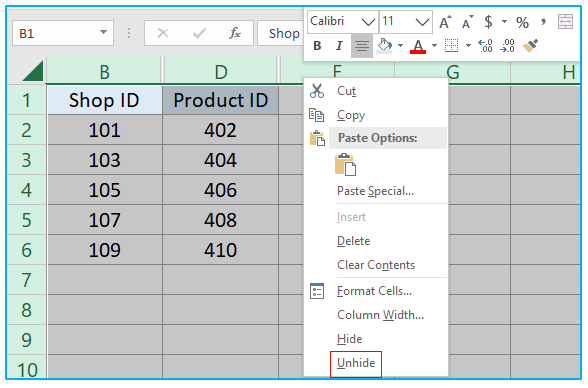
Step 2: When you select Unhide, all the hidden columns in this worksheet will be visible again.
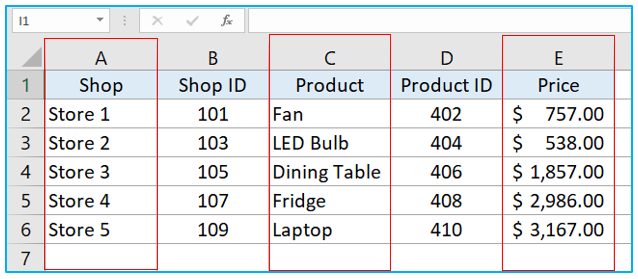
2.2 Using a Keyboard Shortcut
Use CTRL+A to select all the columns in your worksheet. Now press ALT+H+O+U+L keys one after another to unhide all the hidden columns in your worksheet.
Unhide all columns automatically with VBA
Show hidden columns that you select
2.3 Unhide All Columns by Setting the Column Width
Step 1: Select the whole worksheet using CTRL+A command and from Home tab go to Format>>Column Width.
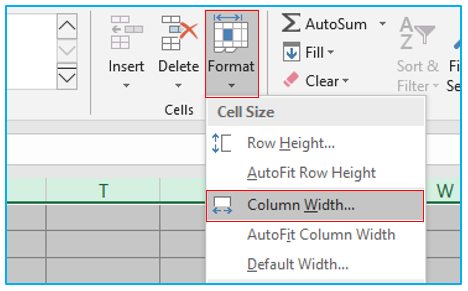
Step 2: Insert a value which will be large enough to show the columns in the worksheet and click OK. The hidden columns will be unhidden.
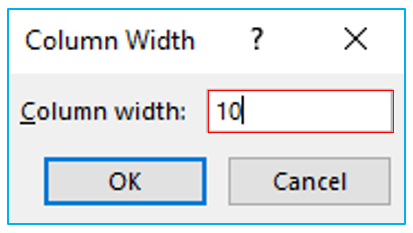
2.4 Using a VBA Script
Step 1: Right-click on your worksheet name and select View Code.
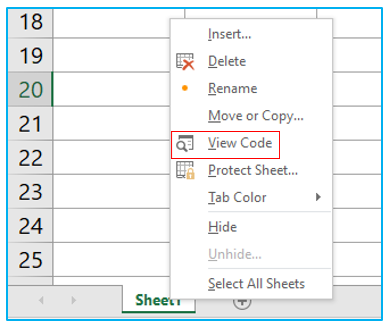
Step 2: Insert this code given below inside the VBA Script Box and click on RUN. All the hidden columns will be visible now in your worksheet.
Sub UnhideAllColumns()
Cells.EntireColumn.Hidden = False
End Sub
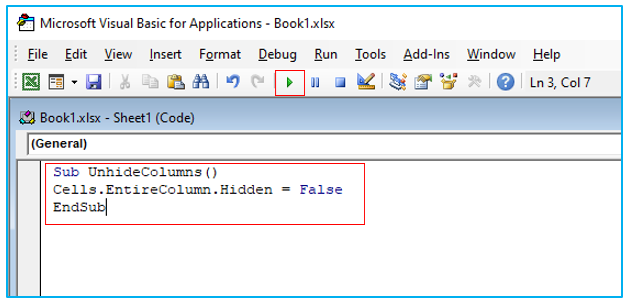 3. How to Show all Hidden Columns Via Go to Special?
3. How to Show all Hidden Columns Via Go to Special?
Step 1: Click on F5 key from your keyboard to activate Go To dialogue box and select Special.
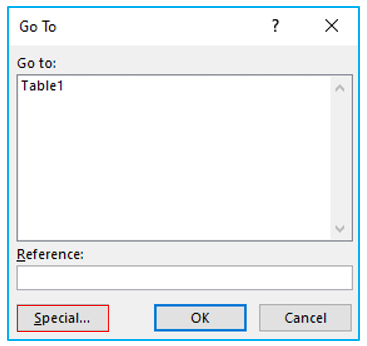
Step 2: Select Visible cells only and click on OK.
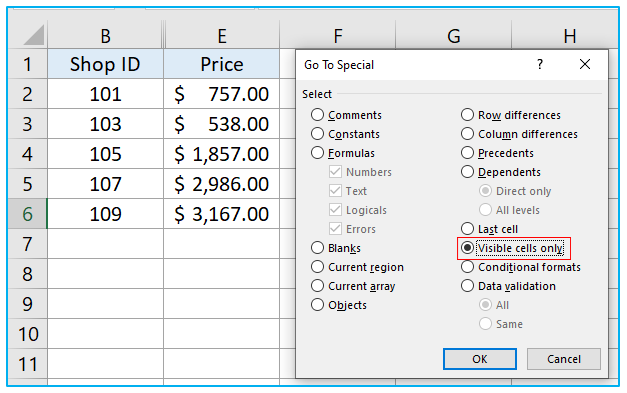
Step 3: The whole visible portion of the table will be highlighted, and the adjacent column borders to the hidden column borders will turn whitish.
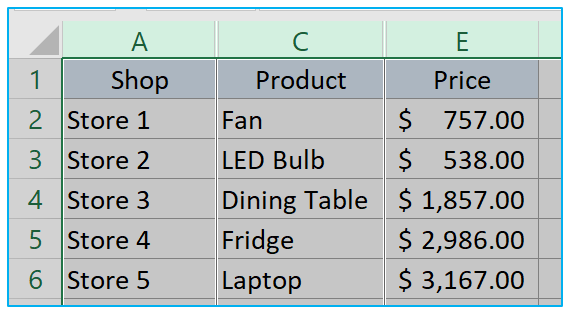 4. How to Check a Workbook for the Number of Hidden Columns?
4. How to Check a Workbook for the Number of Hidden Columns?
Step 1: Go to File>>Info>>Check for Issues>>Inspect Document.
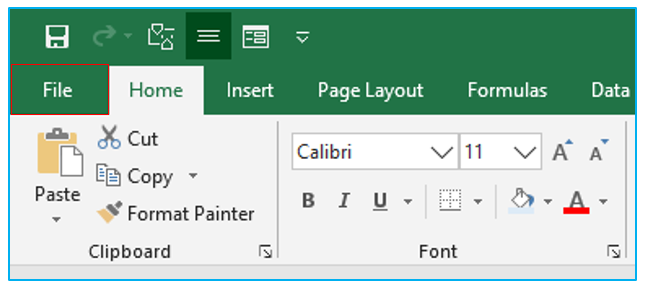
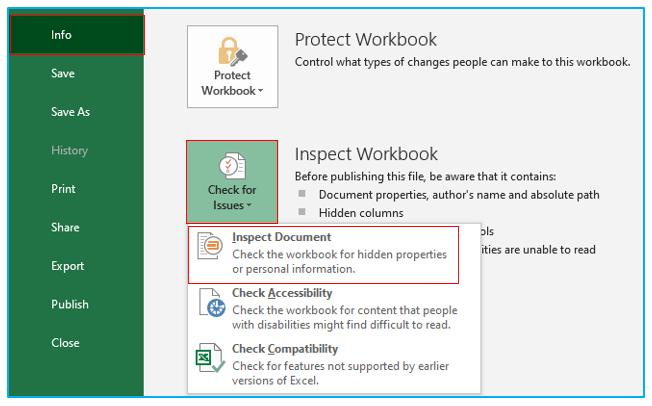
Step 2: Select Yes or No from the dialogue box according to your preferences.

Step 3: Check Hidden Rows and Columns and select Inspect.
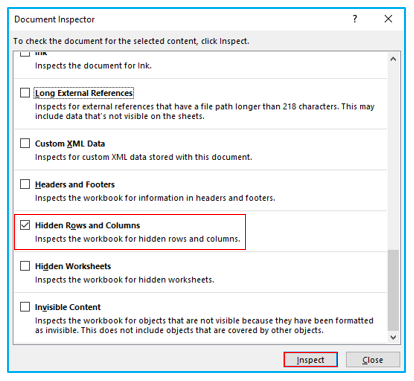
Step 4: As soon as the inspection is over this dialogue box will appear with the inspection result. Here you can see how many columns are hidden in this worksheet.
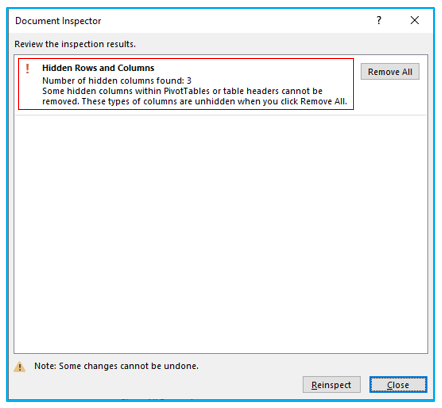 5. How to Disable Unhide Column Option in Excel?
5. How to Disable Unhide Column Option in Excel?
If you are working on a worksheet and you have to share this file with someone else for work purposes but don’t want them to be able to unhide columns you have hidden, then follow the steps below to see how you can disable the unhide column option for your worksheet in Excel.
Step 1: Select the whole worksheet by using CTRL+A command and then right-click. Select Format Cells.
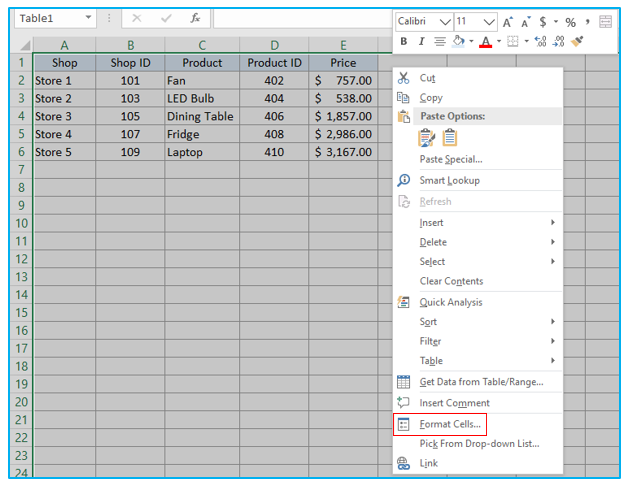
Step 2: From Format Cells dialogue box select Protection and uncheck Locked. Click OK.
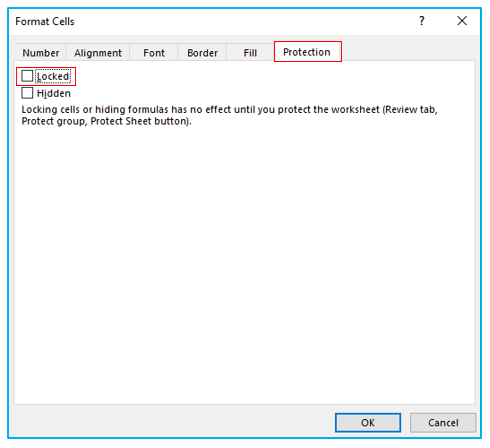
Step 3: Hold the CTRL key and select the columns u want to protect from being unhidden and go to Format cells dialogue box. Check Locked and click OK.
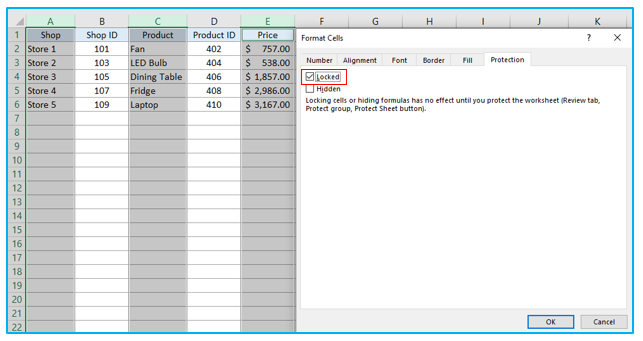
Step 4: Select the columns by holding CTRL key and right click on the column header of any of the selected column. Select Hide to hide these columns.
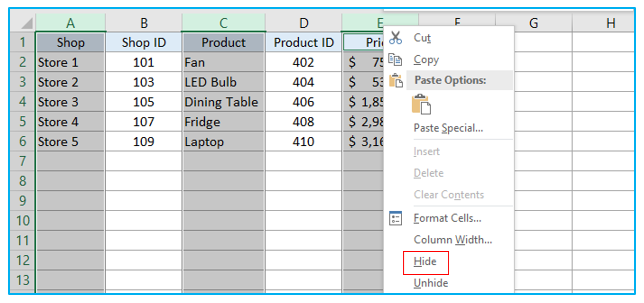
Step 5: Go to Review>>Protect Sheet. Check Select locked cells and Select unlocked cells. Set a Password then click OK.
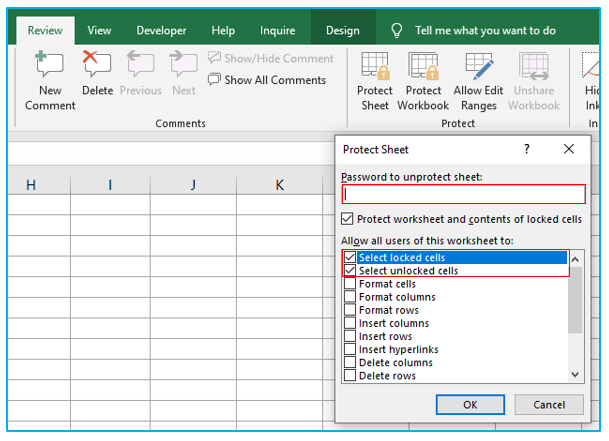
Step 6: Type the password again inside Confirm Password dialogue box and click OK.
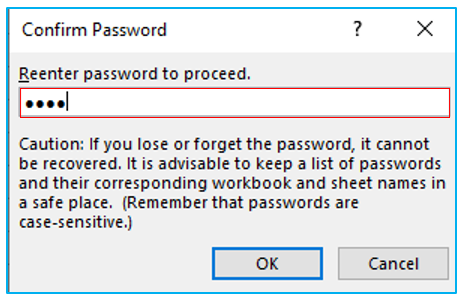
Step 7: The hidden columns are locked and unhide option will be unavailable for anyone who tries to unhide the hidden columns.
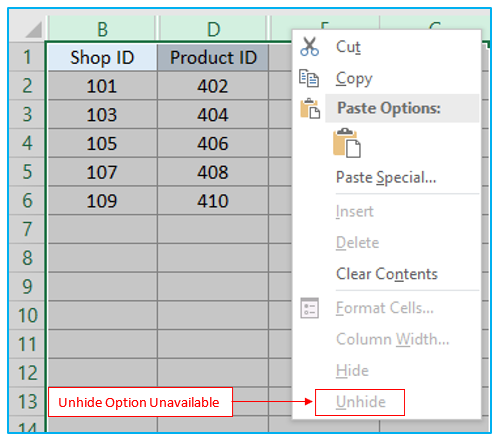
Application of Unhide Columns in Excel
- Data Review:
- Unhide columns to review and verify hidden data, ensuring data integrity and accuracy.
- Data Entry Correction:
- Correct errors or update information in previously hidden columns without recreating the entire worksheet.
- Customized Reports:
- Unhide specific columns to create customized reports or views tailored to your audience’s needs.
- Data Comparison:
- Compare data in hidden columns with visible data to identify discrepancies or trends.
- Print Optimization:
- Unhide columns before printing to include all necessary data in physical or PDF copies of your worksheet.
- Formula Validation:
- Check and validate formulas in hidden columns for accuracy and consistency with other data.
Unhiding columns in Excel ensures that you have complete access to your data, allowing for data analysis, correction, and customization as needed.
You may be interested:
